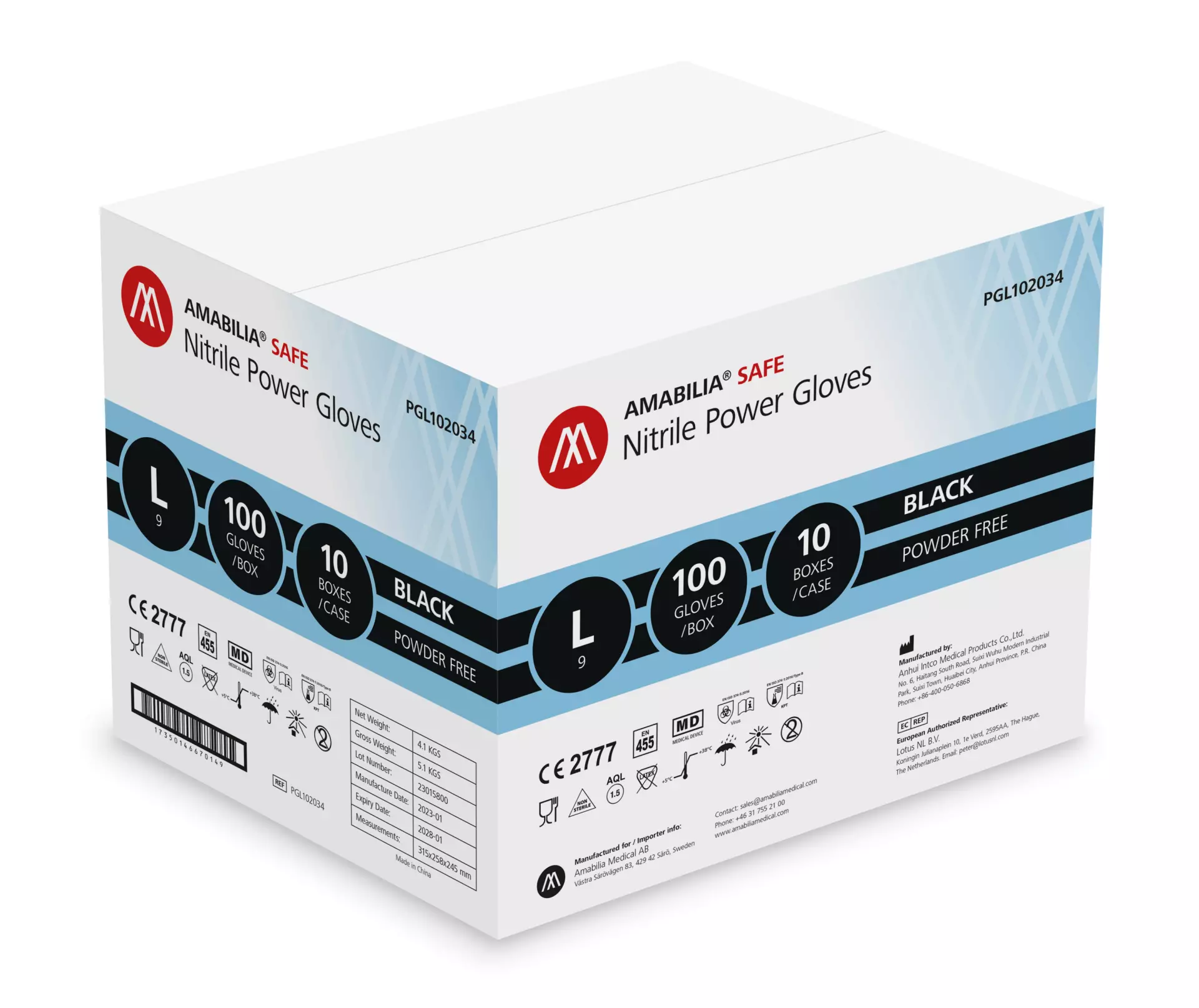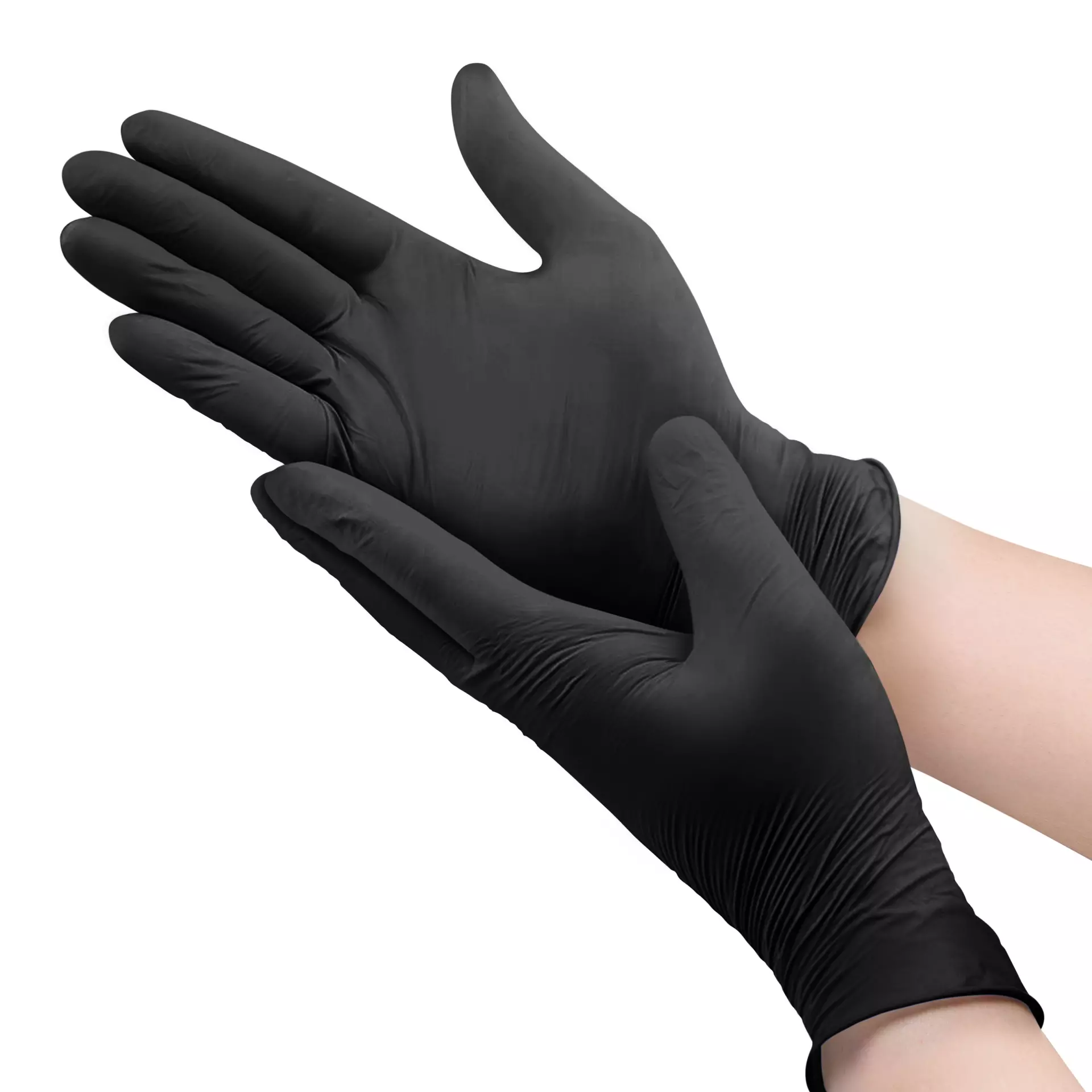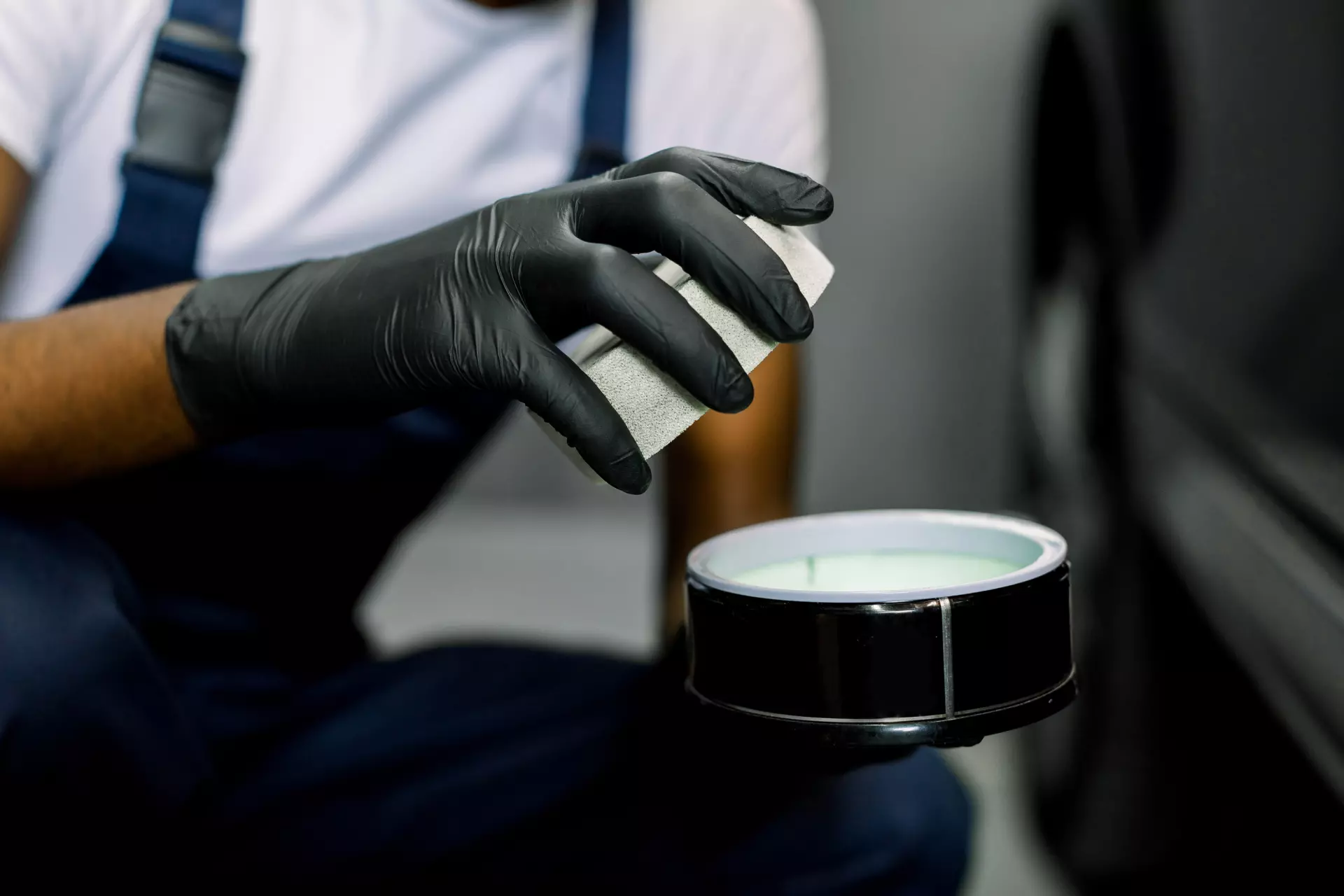
Amabilia Safe Nitrile Power Glove Black
Amabilia Safe Nitrile Power Glove Black
4.5 / 5







Features You'll Love

Surface · Smooth
The texture of the glove exterior, affecting grip strength and handling capability for different tasks and working conditions.
The texture of the glove exterior, affecting grip strength and handling capability for different tasks and working conditions.
The texture of the glove exterior, affecting grip strength and handling capability for different tasks and working conditions.

Finger Thickness · 0.14 mm
Measures the material thickness at the fingertips, affecting tactile sensitivity, dexterity, and protection level during use.
Measures the material thickness at the fingertips, affecting tactile sensitivity, dexterity, and protection level during use.
Measures the material thickness at the fingertips, affecting tactile sensitivity, dexterity, and protection level during use.

Cuff Style · Rolled
The design of the wrist opening, affecting ease of putting gloves on, comfort, and how securely they stay in place during use.
The design of the wrist opening, affecting ease of putting gloves on, comfort, and how securely they stay in place during use.
The design of the wrist opening, affecting ease of putting gloves on, comfort, and how securely they stay in place during use.
64,44 €
Price per 10 packages (1 000 pcs)
6,44 € / 100 pcs
Free delivery
Features You'll Love

Surface · Smooth
The texture of the glove exterior, affecting grip strength and handling capability for different tasks and working conditions.
The texture of the glove exterior, affecting grip strength and handling capability for different tasks and working conditions.
The texture of the glove exterior, affecting grip strength and handling capability for different tasks and working conditions.

Finger Thickness · 0.14 mm
Measures the material thickness at the fingertips, affecting tactile sensitivity, dexterity, and protection level during use.
Measures the material thickness at the fingertips, affecting tactile sensitivity, dexterity, and protection level during use.
Measures the material thickness at the fingertips, affecting tactile sensitivity, dexterity, and protection level during use.

Cuff Style · Rolled
The design of the wrist opening, affecting ease of putting gloves on, comfort, and how securely they stay in place during use.
The design of the wrist opening, affecting ease of putting gloves on, comfort, and how securely they stay in place during use.
The design of the wrist opening, affecting ease of putting gloves on, comfort, and how securely they stay in place during use.
Product description
The product description has not been specified
The product description has not been specified
The product description has not been specified
The texture of the glove exterior, affecting grip strength and handling capability for different tasks and working conditions.
Describes the surface texture of the fingertip area, affecting grip strength and tactile sensitivity during use.
Indicates how long gloves maintain their protective properties and quality when stored properly, typically measured in years from manufacture date.
Complete finger coverage ensures full protection and hygiene for your hands, maintaining dexterity for all tasks.
Protects sensitive surfaces from silicone contamination, ensuring product integrity and quality.
Your go-to gloves for diverse tasks, offering reliable protection and convenience across many applications.
Long sleeves offer extended protection, keeping your arms clean and dry from splashes and contaminants, even during immersion.
Provides comfort and peace of mind, free from natural rubber latex to protect sensitive skin.
Indicates the maximum percentage of defective gloves acceptable in quality testing, with lower numbers representing higher quality standards.
Measures the material thickness at the palm area, affecting protection level and tactile sensitivity during use.
Measures the material thickness at the fingertips, affecting tactile sensitivity, dexterity, and protection level during use.
Measures the thickness of the glove's wrist/forearm extension, affecting durability, tear resistance, and protection level during use.
Indicates whether gloves contain powder on the interior surface to aid donning, affecting ease of use and contamination control requirements.
The base substance used to manufacture the glove, affecting chemical resistance, durability, flexibility, and compatibility with specific applications.
The visual appearance of the glove material, ranging from basic colors to specialized options for different professional and aesthetic preferences.
Total mass of the glove package, useful for shipping calculations, storage planning, and comparing product quantities across different brands.
The design of the wrist opening, affecting ease of putting gloves on, comfort, and how securely they stay in place during use.
- Chemical Resistance
- Food Service
- Medical Protection
- Antimicrobial Protection
- Hand Protection
Products and services from companies with the EN ISO 9001 rating are tested for consistent quality through a robust management system. This means you can expect reliable products and services, fewer issues, and a commitment to meeting your needs.
Medical gloves with the EN 455-1 rating are tested for freedom from holes to ensure they act as an effective barrier. This means the gloves reliably protect users and others from the transmission of microorganisms and contamination.
Medical gloves with the EN 455-4 rating are tested for their shelf life, ensuring they maintain critical properties like strength and barrier integrity over time. This means you can trust that the gloves will remain effective and safe to use until their expiration date, providing reliable protection when needed.
Medical devices with the ISO 13485 rating are tested for their manufacturer's quality management system, ensuring consistent safety and effectiveness. This means you can trust that these products are made with strict quality controls to help ensure they are safe and reliable for their intended use.
Protective gloves with the EN 420:2003+A1:2009 rating are tested for general design, safe materials (innocuousness), water penetration, comfort, and dexterity. This ensures the gloves are safe, fit correctly, and allow you to perform tasks effectively without discomfort.
Gloves with the EN 374-4 rating are tested for resistance to degradation, which is how the glove material changes after chemical contact. This ensures the gloves maintain their protective strength and barrier, keeping your hands safe from hazardous chemicals.
Protective gloves with the EN ISO 21420:2020 rating are tested for general requirements, including design, construction, the absence of harmful chemicals, correct sizing, and dexterity. This ensures the gloves are safe and comfortable to wear, fit correctly, and won't cause adverse skin reactions.
Test results
Ensures gloves are designed for comfort, fit, and dexterity without using harmful materials. It covers general requirements like safe pH levels and non-toxic dyes, forming the foundation for all protective gloves.
Gloves with the EN 374-1:1995 rating are tested for their ability to protect against dangerous chemicals and microorganisms, by measuring resistance to chemicals seeping or leaking through the material. This ensures the gloves provide a reliable barrier for user safety.
Test results
This glove provides moderate protection against chemicals, resisting permeation for at least 30 minutes for a minimum of three specific test chemicals. It is suitable for tasks involving handling certain chemicals where prolonged contact is not expected.
Gloves with the EN 374-5:2016 rating are tested for resistance to penetration by bacteria and fungi, and potentially viruses. This means the gloves provide a protective barrier against microorganisms, helping to keep your hands safe from harmful biological agents.
Test results
This glove is tested to protect you from bacteria, fungi, and viruses. It provides a reliable barrier, having passed specific tests to ensure no leakage when exposed to these micro-organisms, making it suitable for handling contaminated materials.
Gloves with the EN 374-2:1994 rating are tested for resistance to penetration by dangerous chemicals and microorganisms. This means the gloves prevent liquids from seeping through tiny holes or imperfections, ensuring your hands are protected.
Test results
This glove protects against leaks of chemicals and microorganisms. It has passed an air and water leak test to ensure it is a waterproof and effective barrier, making it suitable for tasks like cleaning or handling biological materials.
Protective clothing, gloves, and footwear materials with the EN 16523-1:2015+A1:2018 rating are tested for resistance to permeation by hazardous liquid chemicals. This means the material provides a measured level of protection against chemicals passing through it, helping you choose safety gear that resists liquid chemical exposure.
Test results
This product’s material is tested for resistance against breakthrough from potentially hazardous liquid chemicals. It measures the time it takes for a chemical to move through the material, ensuring protection during continuous contact.
Gloves with the EN 374-3 rating are tested for their resistance to permeation by hazardous chemicals. This measures how long it takes for dangerous liquids to break through the glove material, helping you select the right protection for working with chemicals.
Single-use medical gloves with the EN 455-3 rating are tested for biological safety, including potential chemical residues, latex proteins, and powder content. This ensures the gloves are safe for skin contact, minimizing the risk of irritation or allergic reactions for users and patients.
Medical gloves with the EN 455-2 rating are tested for physical properties like dimensions and strength, including force at break both before and after aging. This ensures the gloves fit correctly, are durable, and provide reliable protection against cross-contamination for both patient and user.
Food safe refers to the safety of food products that are used or consumed by people. In Europe, food safety is regulated by the European Union (EU) and the European Food Safety Authority (EFSA). These organizations set standards and requirements for food products to ensure they are safe to eat. To be considered "food safe" in Europe, a product must meet these standards and be free of harmful substances. This includes being free of harmful bacteria, pesticides, and other contaminants. Food products that do not meet these standards cannot be sold or used in the EU.
Free delivery for all Amabilia Medical products
Other products you may like
Similar products you may like
Find +150,000 products from hundreds of brands